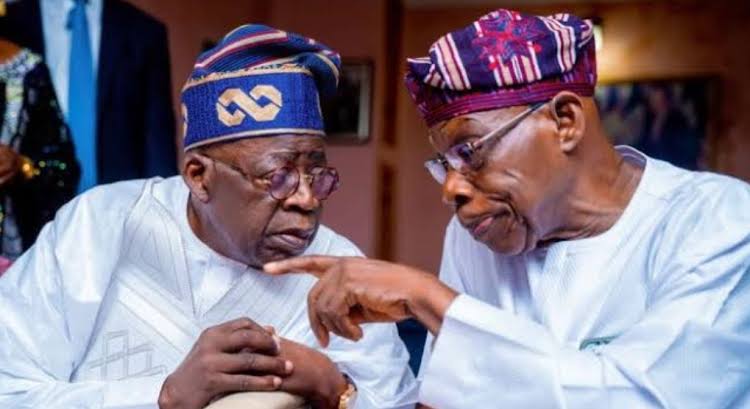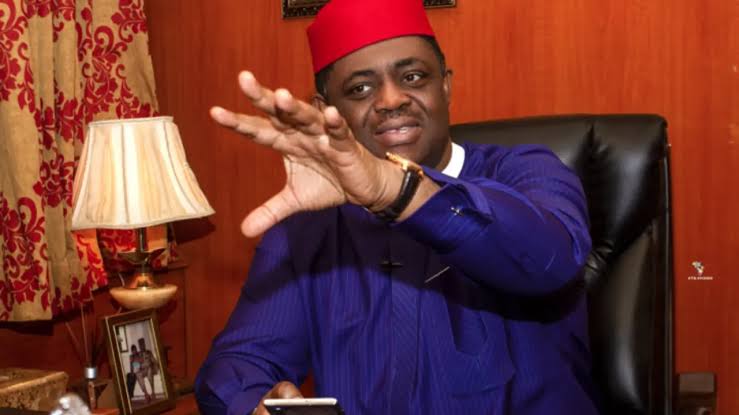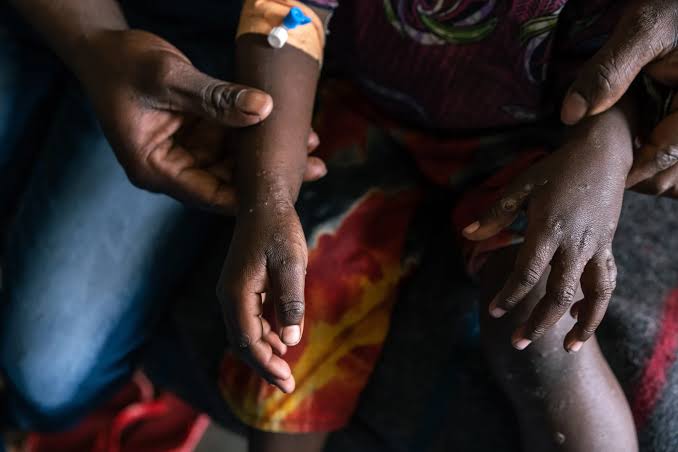Metro
Nigeria has become a ‘failing state’ under Tinubu— Ex-President Obasanjo
Published
2 months agoon
By
Isaac Dachen
YFormer Nigerian President, Olusegun Obasanjo, has described the country under incumbent President Bola Tinubu as a “failing state” which is characterized by pervasive corruption, leadership failure, hardship and hunger.
Obasanjo, who made the assertion while delivering a keynote address at the Chinua Achebe Leadership Forum, Yale University, New Haven Connecticut, USA, said Nigeria was speedily becoming a bad case under the leadership of President Tinubu whom he referred to as “Emilokan” and “Baba-go-slow”.
The former Head of State, fondly called OBJ, who spoke on the theme ‘Leadership Failure and State Capture in Nigeria”, added that the country was suffering from state capture as a result of the lackluster leadership of the Tinubu-led administration.
He noted that chaos, insecurity6y, conflict, discord, division, disunity, depression, youth restiveness, confusion, violence, and underdevelopment had become permanent occurrences in this dispensation, leading the country into a failed path.
”As we can see and understand, Nigeria’s situation is bad. The more the immorality and corruption of a nation, the more the nation sinks into chaos, insecurity, conflict, discord, division, disunity, depression, youth restiveness, confusion, violence, and underdevelopment,” OBJ said.
“That’s the situation mostly in Nigeria in the reign of Baba-go-slow and Emilokan. The failing state status of Nigeria is confirmed and glaringly indicated and manifested for every honest person to see through the consequences of the level of our pervasive corruption, mediocrity, immorality, misconduct, mismanagement, perversion, injustice, incompetence and all other forms of iniquity. But yes, there is hope.”
The former President also described state capture as “one of the most pervasive forms of corruption, a situation where powerful individuals, institutions, companies, or groups within or outside a country use corruption to shape a nation’s policies, legal environment, and economy, to benefit their private interests.”
“State capture is not always overt and obvious. It can also arise from the more subtle close alignment of interests between specific business and political elites through family ties, friendships, and the intertwined ownership of economic assets.
“What is happening in Nigeria right before our eyes is state capture. The purchase of national assets by political elites and their family members at bargain prices, the allocation of national resources, minerals, land, and even human resources, to local, regional, and international actors. It must be prohibited and prevented through local and international laws.
“Public institutions such as the legislature, the executive, the judiciary, and regulatory agencies both at the federal and local levels are subject to capture. As such, state capture can broadly be understood as the disproportionate and unregulated influence of interest groups or decision-making processes, where special interest groups manage to bend state laws, policies, and regulations,” OBJ added.
The former president stressed that Nigeria’s dire situation is evident to “every honest person.”
He further warned that the country is sinking deeper into insecurity, division, and underdevelopment due to widespread corruption, mediocrity, and a lack of accountability.
You may like
-


Nigeria: Marketers predict further price cut as another refinery begins operations
-


Nigeria, China extend $2bn currency swap deal
-


‘Don’t start what you can’t finish’, ex-Nigerian official replies President Tchiani
-


Again, Starlink raises prices of its services in Nigeria
-


Niger citizen knocks President Tchiani for neglecting critical issues at home to peddle rumours against Nigeria
-


Dumping England for Nigeria the best decision of my life— Ademola Lookman
Metro
‘Don’t start what you can’t finish’, ex-Nigerian official replies President Tchiani
Published
3 weeks agoon
December 29, 2024
Former Nigerian Aviation Minister, Femi Fani-Kayode, has told President Abdourahamane Tchiani of Niger Republic to refrain from making infantile and puerile allegations that Nigeria is conniving with France and the Lakurawa terrorists to destabilize his country.
Tchiani had, during an interview with Radio-Télévision du Niger on December 25, accused the Nigerian government of using the sect, with the help of foreign security forces notably from France, to wreck havoc in his country, insinuating that President Bola Tinubu had been paid by the France government to allow their military to establish a base in Borno State.
He also alleged that Nigeria, acting in collaboration with the French government and the terrorist group, was responsible for an attack on the Niger-Benin oil pipeline on December 13, 2024, in Gaya, Dosso Region of Niger Republic.
But in a statement he posted on his official X handle on Sunday, Fani-Kayode who is popularly called FFK, said Nigeria does not need the help of France and thr Lakurawa terrorist to destabilize Niger Republic.
FFK insisted that Nigeria is not part of the western powers sponsoring terrorists organizations to wretch havoc on the West African sub region.
“If Nigeria wanted to destabilise Niger Republic, I do not believe that we would need France or any terrorist organisation to do so,” the politician wrote.
He noted that on the contrary, western powers are the ones behind terrorist organizations operating in the region and other parts of Africa.
“I have maintained that the western powers are behind the terrorist groups that have plagued the West African sub region over the last 15 years and for the last ten years I have publicly stated this and given my reasons.
“I am equally certain that Nigeria, being one of the major victims of these terrorist organisations, has had no part in it and that no Nigerian President, past or present, has indulged in such grave and dangerous actions.”
He went on to advice Tchiani against provoking Nigeria with unguarded and infantile utterances capable of stoking Nigeria against his country.
“The Nigerien Military Head of State, Abdourahamane Tchiani, would do well to be careful not to provoke our wrath with his absurd assertions and remain mindful of the fact that the defence budget for his country, Mali and Burkina Faso COMBINED is not up to 25% of Nigeria’s.
“Tchiani’s grave allegations that President Tinubu and NSA Nuhu Ribadu have been bought by the French to destabilise Niger Republic, that our Government is jointly sponsoring a terrorist group with France to do same and that there are French military bases in Nigeria are infantile, puerile, mendacious and asinine.
“It is a squalid attempt by the Nigerien Head of State to sow the seeds of dissention in our country, to alienate our people from constituted authority, to divide our people and to undermine the Tinubu administration,” he added.
“It is also highly provocative and the FG should consider the possibility of taking other more extreeme measures if this reckless provocation continues.
“We are under no obligation to show restraint when we are being undermined and maligned.
Metro
Zambia announces second case of Mpox as country battles cholera outbreak
Published
4 weeks agoon
December 28, 2024
The Zambian Ministry of Health has reported a second case of Monkeypox, popularly known as Mpox, in Kitwe region of Copperbelt Province.
Acting Health Minister, Douglas Syakalima, who made the announcement on Friday during a press conference in Lusaka, revealed that the Ministry is intensifying contact tracing and surveillance to curb further spread of the disease.
Syakalima who also addressed the ongoing cholera outbreak in Nakonde, Muchinga Province, said thus far, seven cases have been confirmed.
“The second Mpox case involves a 34-year-old female from Ndeke, Kitwe, who presented with symptoms including rash, fever, swollen lymph nodes, and oral ulcers on December 21,” Syakalima said at the press parley.
He noted that there was an initial misdiagnosis with chickenpox in Lumwana, North-Western Province, but laboratory tests on December 26 confirmed that it was Mpox.
Syakalima added that the patient’s husband, who works in a neighboring country with confirmed Mpox cases, had experienced similar symptoms earlier this month.
“Both patients are now stable and under close monitoring. A rapid response team has been deployed to trace contacts and prevent further spread,” he said, adding that eight close contacts of the couple are currently under observation, while nationwide surveillance has been heightened.
The Health Minister added that on December 26, five cholera cases were confirmed at Nakonde Urban Clinic with the first three patients, a husband, wife, and their son, admitted on December 24 with symptoms of diarrhea, vomiting, dehydration, and shock.
“Today, two more cases have been reported, bringing the total to seven confirmed cholera cases from the same household,” Syakalima stated.
He explained that Nakonde’s location as a border town with high cross-border movement poses a risk for the disease to spread to other parts of the country.
The Minister however, assured that the Ministry has deployed teams to trace contacts, chlorinate water sources, disinfect affected homes, and activate Incident Management Systems at district and provincial levels while surveillance has been heightened, and contact tracing is ongoing for 33 individuals.
“The government remains committed to preventing further spread of these diseases,” Syakalima assured.
EDITOR’S PICK


Nigeria: Marketers predict further price cut as another refinery begins operations
Oil marketers and the Nigerian Midstream and Downstream Petroleum Regulatory Authority expect refined petroleum product prices to reduce as another...


Kenya: Consumer inflation rises to 3.0% from 2.8%
Kenya’s statistics agency said on Tuesday that Kenya’s consumer price inflation increased slightly to 3.0% year-over-year in December from 2.8%...


South Africa’s Transnet’s half-year deficit hits $117m
Transnet, a state-owned logistics company in South Africa, announced on Tuesday that it had lost 2.2 billion rand ($117.48 million)...


Nigeria, China extend $2bn currency swap deal
A 15 billion yuan ($2 billion) currency-swap arrangement between China and Nigeria has been extended to boost investment and commerce...


Egypt’s central bank maintains overnight rates
As anticipated, Egypt’s central bank has maintained its overnight interest rates, stating that although inflation was predicted to drop significantly...


Illicit flows cost Nigeria, others $1.6bn daily— AfDB
According to the African Development Bank (AfDB), illicit money flows and profit shifting by multinational corporations doing business in Africa...


‘Don’t start what you can’t finish’, ex-Nigerian official replies President Tchiani
Former Nigerian Aviation Minister, Femi Fani-Kayode, has told President Abdourahamane Tchiani of Niger Republic to refrain from making infantile and...


Again, Starlink raises prices of its services in Nigeria
Elon Musk’s satellite internet service provider, Starlink, has again jacked up the prices of its services in Nigeria after an...


Former President of Moroccan club Raja sentenced to 3 years in prison
The former President of Moroccan top club, Raja Casablanca, Mohamed Aouzal, has been sentenced to three and a half years...


Zambia announces second case of Mpox as country battles cholera outbreak
The Zambian Ministry of Health has reported a second case of Monkeypox, popularly known as Mpox, in Kitwe region of...


